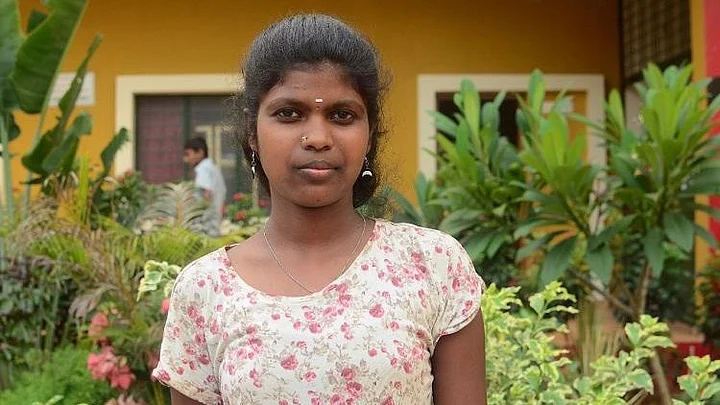Seventeen-year-old Bengaluru girl Kanaka had planned to attend a science exhibition on Sunday in the city, just like she would do every other weekend.
Instead, she will now be leaving for New Delhi to address our parliamentarians on issues affecting children across the country, as part of a United Nations International Children’s Emergency Fund (UNICEF) initiative on 20 November.
Kanaka, and four other children from all over India, will be speaking to the lawmakers on the occasion of International Children’s Day. Kanaka was selected to speak as part of the children’s takeover of the ‘Parliamentarians’ Group of Children’ programme. The five were selected after a thorough screening process.
While this alone makes it commendable, the 17-year-old’s difficult childhood only makes the selection praiseworthy.
Born to a low-income Tamil family in a Bengaluru slum, Kanaka was forced to fend for herself very early in her life. Not only that, she had to look after her disabled father and two younger siblings after her mother passed away due to cancer when Kanaka was just 11-years-old. She also had to leave school after class 4, even though she was a good student, and start working.
Kanaka began working as a domestic help in homes and wedding halls during which she was subjected to sexual and other forms of abuse.
Despite her horrific situation, she did not lose her confidence. She worked hard to ensure that she had a better life, not just for herself, but for others as well.
While working as a cleaner in a Yeshwantpur wedding hall, she was rescued by members of Sparsha, a child rights NGO, and currently lives with the organisation.
When TNM met Kanaka, the super-achiever appeared to be soft-spoken and shy. Dressed in a white salwar kameez with neatly braided hair, the bright-eyed girl spoke calmly, but with a quiet confidence and clarity seldom associated with a teenager.
Speaking about laws against child labour and child marriage, Kanaka says, “There are many laws meant for children, but they are not thoroughly implemented.”
Karnataka sees some of the highest number of child marriages in the country. When asked about this, Kanaka explains that a major part of the crisis is due to lack of awareness.
I will speak about child abuse which I have experienced in my life. This is not a problem that only I have faced, but it is faced by every girl child. I want to tell the MPs what it takes to stop child sexual abuse.
“Before, when I was abused, I used to sit quietly and not speak up. I did not know we have rights – the right to life, right to education. Now, I am fighting to make every girl and boy aware of this. We have to make everybody aware of this,” she adds.
Other than her goal of making people aware of child rights, Kanaka says that she aims to become a scientist. She currently studies science in PU-I at BGS School.
Apart from school and science workshops, Kanaka also spends her time practicing Yakshagana and Kolata, two ancient art forms of Karnataka.
Gopinath, a trustee at Sparsha, is full of praise for her. “Kanaka is not only a good student but a leader. She takes care of younger kids at the home and is a role model. Unlike many who are abused, she is very extroverted and always learning new things,” he says.
However, Kanaka is worried about her siblings. Her brother left home and has become addicted to drugs. The situation is similar with her sister, who she says is deeply traumatised due to abuse, and has left the NGO despite multiple attempts to rescue her.
Child Abuse in India and How You Can Help Fight It
Despite stringent laws against child abuse, the problem is rampant in India. Abuse can be physical, emotional, or sexual. Often children are abused in the confines of their homes.
A report by the Union Ministry of Women and Child Development estimated 50 million girls and 73 million boys under 18 were victims of child sexual abuse. The study also found that 69% of children reported to have been physically abused. Out of these 54.68% were boys. 52.91% of boys and 47.09 % of girls reported having been abused in their family environment. Of the children who were abused in family situations, 88.6% were abused by their parents.
More recently in May 2017, out 45,000 plus children of 12-18 years surveyed by an NGO, revealed that half of them were victims of child sexual abuse. According to the survey, one in four families do not report incidences of child abuse.
If you find any child being abused in any form, you should get in touch with the local police and also call Childline (1098) which works across India. There are also numerous aid organisations and NGOs which work to rescue and rehabilitate children.
(This article was originally published in The News Minute)
(At The Quint, we question everything. Play an active role in shaping our journalism by becoming a member today.)
